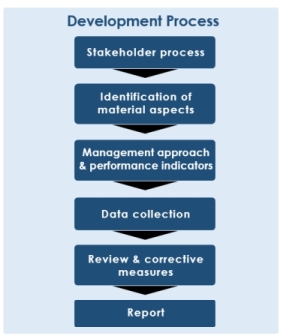CONNEXIS Sustainability Reporting - GRI & IR
More and more companies and organizations report pro-actively on their sustainable development contributions and performance, either within annual reports or in dedicated CSR-ESG reports.
Pro-active reporting on sustainability helps companies to
- Identify and set measurable targets
- Measure their progress and performance against these targets
- Manage and control change within their organizations
- Make their entire business model more sustainable.
EU Guideline obliges PIEs to report on sustainability from 2017
Starting with the reporting period of 2017, EU DIrective EU RL 2013/34/EU obliges all Public Interest Entities (PIEs) to report on their contributions to sustainable development. The regulation defines PIEs as
- All stock-exchange listed companies as well as
- Banks & insurances with over 500 employees & over EUR 40MM in sales or EUR 20MM in assets
Over 5,000 SMEs affected as suppliers in Germany
A large number of small and medium sized enterprises (SMEs) will be indirectly affected as suppliers and vendors since PIEs will require detailed sustainability information from their supply chain. It is estimated that more than 5,000 companies will be directly or indirectly obliged to report on their sustainability in Germany alone.
For more details on the new EU Directive as well as our tailored services to comply with the new regulation please see here.
Benefits of Standardized Reporting
Internationally agreed disclosures and metrics make sustainability reports more accessible and more comparable, providing stakeholders with enhanced information. Organizations can of course report their sustainability performance according to their own preferences and needs. However, following international standards of sustaibility reporting (such as e.g. the Global Reporting Initiative) brings several advantages:
- Improved SRI1, CDP2 and DJSI3 rating
- Higher acceptance from financial markets
- Protected reputation with consumers and customers
- Enhanced credibility with the wider public and in-house staff
The Global Reporting Initiative (GRI G4) - Materiality Analysis
Sustainability reporting helps organizations to
- Set goals
- Measure performance and
- Manage change
In this context the Global Reporting Initiative (GRI) developed its fourth set of GRI Sustainability Reporting Guidelines, the G4.
The purpose of the G4 is to help reporters prepare sustainability reports that
- Matter to their stakeholders
- Contain valuable information about the most relevant CSR topics (Materiality Analysis)
- Make such sustainability reporting standard practice.
Structured Development Process
Based on many years of project experience CONNEXIS has developed a structured process for the production of sustainability reports.

CONNEXIS Integrated Reporting (IR)
An integrated report is a concise communication about how an organization’s strategy, governance, performance and prospects, in the context of its external environment, lead to the creation of value in the short, medium and long term.
With CONNEXIS Integrated Reporting is not about writing a report; it’s the process by which organizations identify their risks related to important issues, like human rights, the environment, labor and other social issues. CONNEXIS works with customers to truly integrate <IR> into their processes throughout their entire organization. As a result we enable our customers to convert reporting from a pure cost factor into a highly useful tool for organizational and strategic development.
With CONNEXIS <IR> becomes a strategic exercise for companies to better understand where they are and what trends, issues and topics are strategically important to them, in the short, medium and long term.
1…Socially Responsible Investing 2…Carbon Disclosure Project3… Dow Jones Sustainability Index
